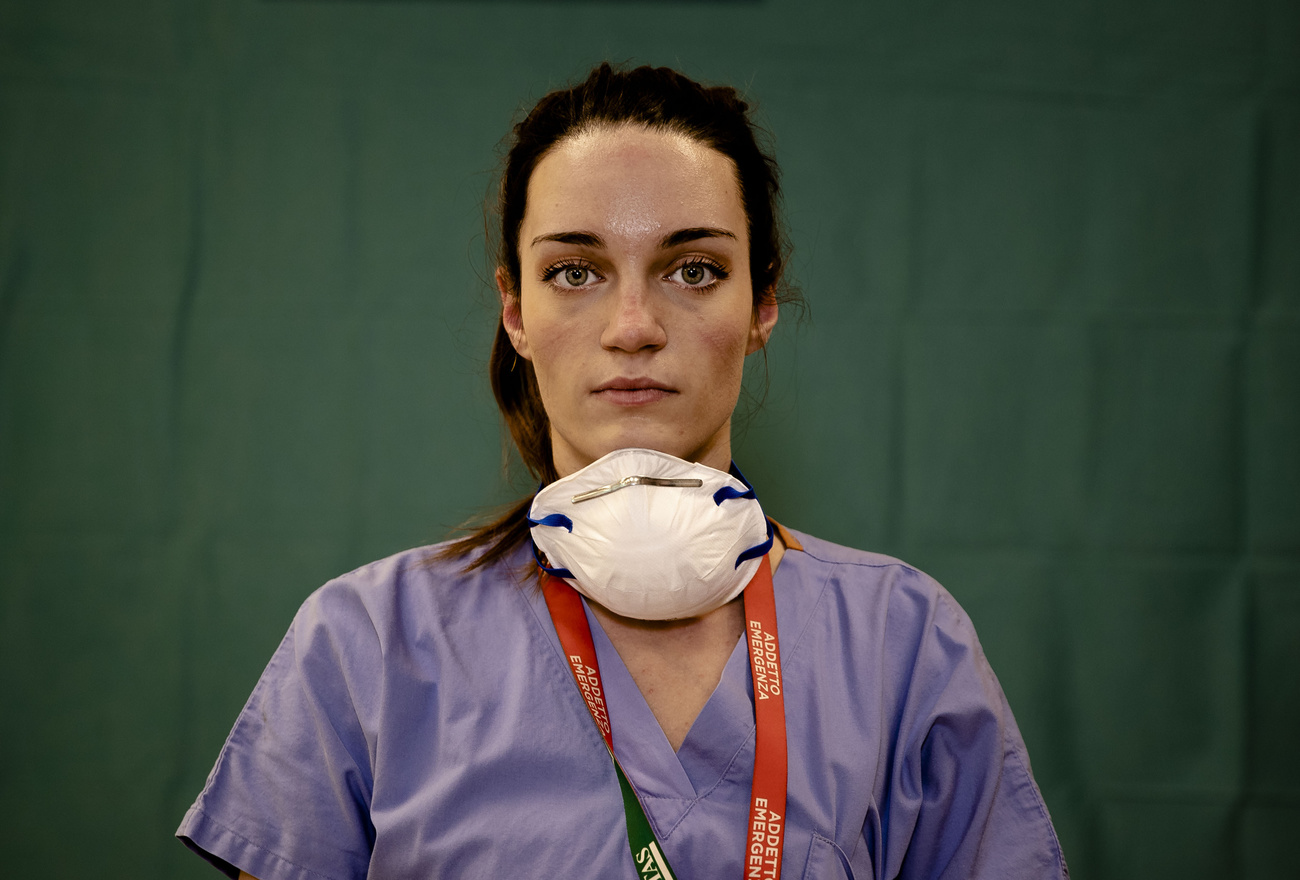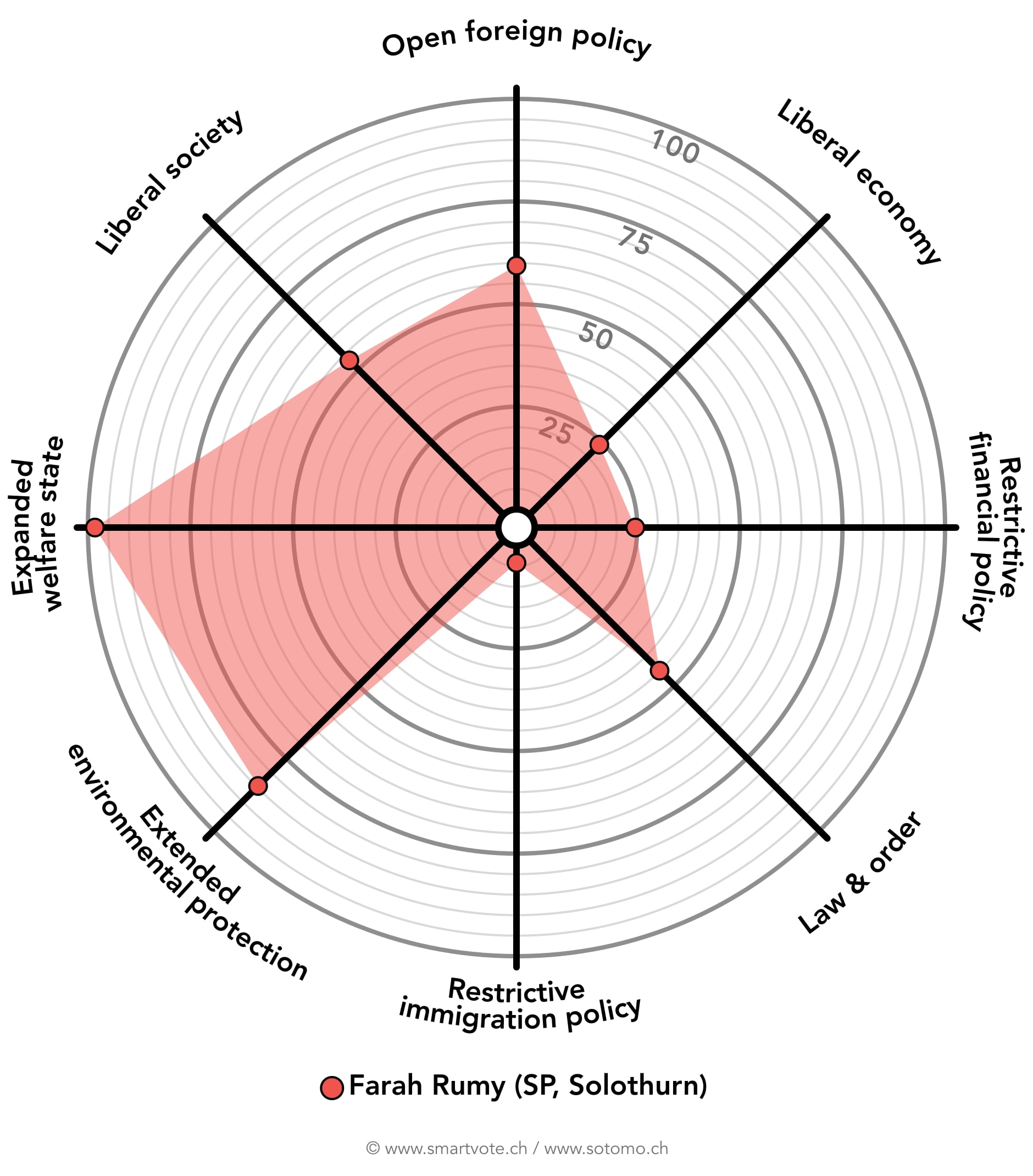
Covid turned new Swiss parliamentarian Farah Rumy into a fighter

The entry into the Swiss parliament of Farah Rumy, a Social Democrat, was one of the surprises of the federal elections last October. Rumy was clearly in the right place at the right time with the right issue – healthcare, which continues to occupy policy-makers.
We met Rumy on the Grenchenberg in the Jura mountains of western Switzerland, which offers spectacular views at an altitude of almost 1,400 metres. Rumy chose this location for our meeting as it has a special significance for her, a Grenchen native. We stop off at the Untergrenchenberg restaurant, famous for its Crèmeschnitten, or vanilla slices, which actually play a role in Rumy’s political work.
Rumy’s election to the House of Representatives last October came as a surprise, largely because she ran for the national parliament after just three years as a member of the Solothurn cantonal assembly and the Grenchen municipal council. For those setting out on a political career, this is part of what is known as the “Ochsentour,” the tour of duty within a Swiss political party – it takes them from the local, to the cantonal and then to the national level.
Last October, Swiss voters chose 56 new representatives to join the federal parliament in Bern. The Swiss People’s Party, the Centre Party, and the Social Democrats made the biggest gains in the 2023 election and sent the greatest number of new faces to parliament. The Green Party, on the other hand, suffered heavy losses and sent no new representatives to Bern.
In this series SWI swissinfo.ch profiles some of these new parliamentarians as they take their first steps in federal politics.
Rumy, who is 32, did all this at a whirlwind pace. The starting gun was fired during the Covid-19 pandemic. As a trained nurse, she experienced its effects first-hand in hospital or in the cardiac catheterisation lab, where life and death are often at stake and quick decisions and swift action are required. Once, when exhausted at the end of a 12-hour shift, she had to console a colleague who was on the verge of physical collapse. She thought to herself: “This can’t go on!”

Rumy repeats this sentence often. “Shortcomings in the healthcare system that have existed for years came to light during Covid,” she says. “And it was primarily the carers and doctors who had to bear the brunt of it.”
She says she became politically engaged as a result of this and began to campaign for the nursing-care initiative. Aimed at improving the situation for carers, this initiative was submitted before the pandemic. But it gained huge momentum from Covid-19 and was accepted in November 2021 by 61% of voters, the first time a petition for a referendum initiated by trade unions has won popular endorsement.
You can read all about the care initiative here:

More
Swiss voters to decide on how to solve the nursing crisis
“My election success is definitely down to this political engagement,” Rumy says. But there were other projects for which she made a name for herself in Grenchen and beyond: a campaign against food wasteExternal link, for example, or an initiativeExternal link for an exchange of letters between generations to alleviate the loneliness experienced during the pandemic by residents of retirement homes.
She only took the step into institutionalised politics after her voluntary work. Her motivation was the realisation that she could only achieve her overarching goal of improving conditions at the national level. Why did she decide to join the Social Democrats? “I filled out a Smartspider questionnaire, two parties came up as possibilities, and I decided in favour of the Social Democrats,” she explains. Sometimes politics is that simple.

But sometimes it isn’t: Rumy’s campaign budget for the parliamentary elections was a few hundred francs. For comparison: the highest declared budget in the 2023 Swiss parliamentary elections was over CHF 370,000 ($422,000, for a man from Zurich, who was not elected). “I don’t think money alone should be decisive in politics – certainly not when it comes to representation in parliament,” Rumy says.
The question of roots
The coverage of her election victory left a bitter aftertaste. “It often focussed on my origins, instead of my track record,” she says. Rumy was born in Colombo, Sri Lanka. Her father found a job in the watch industry in Grenchen and she moved there at the age of six with her mother.
The fact that this background often took centre stage was understandable, she says, but nevertheless annoying. “I am Swiss with roots in Sri Lanka,” she says. “End of story.”
Many media described her profile as atypical. But you could also argue the reverse: Rumy comes from a small town, and a large proportion of the Swiss population live in small towns. She has a migrant background, as do almost 40% of all people in Switzerland. She completed an apprenticeship, the most common educational route in the country. In this respect, Switzerland can also ask itself: why is Rumy perceived as atypical?

“Farah Rumy has travelled a rocky road, like many others with a migrant background,” says Shulojan Suntharalingam. He was a fellow member of the Social Democrats’ migrants groupExternal link in the canton of Solothurn. This branch of the party primarily campaigns for the concerns of people from migrant backgrounds. “Working hours, health insurance premiums, wage negotiations – these are all highly political issues that affect everyone in this country,” Suntharalingam says.
But not everyone can have the same impact. The fact that Rumy has gained admission to the national parliament is also significant because it is less diverse than the population as a whole, he says, adding that she is a credible voice in parliament.
“I see her as a pragmatic politician who can definitely build bridges in Bern,” Suntharalingam says. “She is not afraid to call a spade a spade. But she is also prepared to make compromises.”
New political territory in parliament
Rumy will not only be carrying out her political duties in Bern, but she will also continue to teach future healthcare professionals as a vocational-school teacher, a role that appeals to her. And she will remain active at the local level, for example in Grenchen’s Citizens’ CoExternal linkmmunity, a parallel political structure to the local government. She’s a member of the Community’s executive and for three years has sat on the committee responsible for decisions on citizenship applications.
“Her strengths lie in everything relating to social policy,” says President Eduard Sperisen. He himself is a member of the Radical Party, on the other side of the political spectrum, but says collaboration with her works well. He also finds her to be very focussed and motivated in other matters.
The Citizens’ Community often focuses on tangible issues: it is a public corporation that manages assets. It has several properties, its own forestry operation and three large mountain inns, and it grants building rights and leases agricultural land. It also has to maintain mountain roads. In many Swiss towns, this parallel structure still exists, a remnant from the Middle Ages.
“For us, it’s all about practical politics and party affiliation doesn’t play a major role,” Sperisen says. He is proud that a woman from Grenchen represents the canton of Solothurn in parliament. “She has had a stellar career, no question. But she has also done a lot to make it happen.”
Rumy has given up other mandates, as the workload of parliament combined with her vocational-school teaching is heavy. But her commitment to the community remains important to her. And this is where the vanilla slice comes in: the president of the naturalisation committee often asks candidates whether they know what Grenchenberg’s culinary speciality is.
It is not unusual for such questions to arise in naturalisation procedures in Switzerland, although criticism of these has mounted in recent years, and civil society groups are calling for them to be changed.
New material, old demands
So what are Rumy’s goals in parliament? As a new member, she did not get her desired seat on the social security and health committee – the seats are allocated according to the principle of seniority. Instead, she is on the foreign affairs committee. That means a lot of cramming to familiarise herself with complex subject matter.
“That’s exciting for me,” she says. “What’s more, I can see new ways to get involved – in health policy aspects of Switzerland’s negotiations with the European Union and the issue of labour migration, which is important in the care sector.”

More
How Switzerland recruits nursing staff abroad
She also sees a lot to do elsewhere: Switzerland has one of the most expensive healthcare systems. Health insurance premiums have risen steadily in recent years, which is a major burden for low-income families in particular.
“Purchasing power remains an important issue, and there is a lot of potential for improving efficiency in healthcare”, through digitalisation, reducing bureaucracy and introducing prices that cover costs, Rumy says. She also favours a single health insurance fund, an old demand of the left that has had little hope of success so far. But she believes it’s important to lay the groundwork for this in the future.
And of course, she says, she’s focused on “the full implementation of the nursing care initiative – that’s why I was elected.”
Edited by Balz Rigendinger. Adapted from German by Catherine Hickley/gw

In compliance with the JTI standards
More: SWI swissinfo.ch certified by the Journalism Trust Initiative






























You can find an overview of ongoing debates with our journalists here . Please join us!
If you want to start a conversation about a topic raised in this article or want to report factual errors, email us at english@swissinfo.ch.